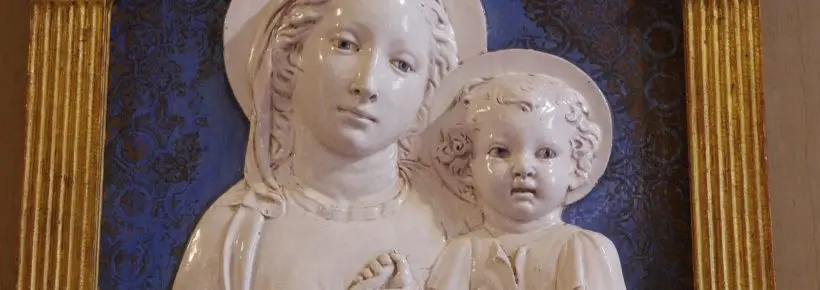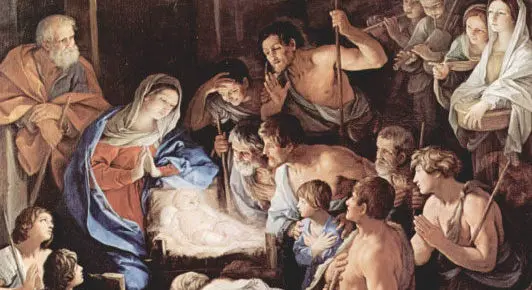On my mantle sits a beautiful statue of the Holy Family. Joseph is seated on a chair and holding Baby Jesus. Mary is reclined on the floor, with her head on Joseph’s lap, fast asleep and safe in his presence. Joseph cradles the baby in one arm, while the other protectively surrounds Mary. The love on his face perfectly depicts how we believe he felt about being a foster father to Jesus and a husband to Mary. And the entire scene depicts the type of fatherly love every dad should strive for.
Fatherhood is a tremendous gift. Obviously, I am not, nor will I ever will be, a father, but because of my own father’s love and because of our Heavenly Father’s love, I can understand the immense gift that fatherhood is. I know that the love my earthly father has shown me throughout my life is merely a fraction of the love that God has for each one of us.
My dad understands the love of our Heavenly Father and he reflects that in all he does. This is the epitome of fatherhood. And this is the type of fatherhood that, in a world fraught with hatred for the preborn, the elderly, and traditional families, we need more of. We need more men to step up and be the fathers that our Heavenly Father wants them to be.
Our World Needs Dads
It has been said that anyone can be a father, but it takes a special man to be a dad. Fatherhood is not just a job or a position within the family; it’s a vocation, a calling.
Yet we know that fathers have become increasingly absent in today’s society, as too many men do not take this role seriously. According to 2023 Census data, “17.8 million children, nearly 1 in 4, live without a biological, step, or adoptive father in the home.”
Children who grow up in a home without a father are more likely to end up in jail, abuse drugs, face abuse and neglect, and exhibit behavioral problems than children who grow up with a father in the home.
But the absence of a faithful Catholic father is even more detrimental to children because it’s detrimental to the soul. We know that the primary role of parents is to get their children to heaven, and fathers are a critical part of that. Children need fathers to guide them in the faith and to teach them about our Father in heaven. For when a child feels that his father is trustworthy, honest, dependable, merciful, and loving, he will be more likely to believe that about our Heavenly Father.
In Lumen Gentium, Pope Paul VI wrote, “The family is, so to speak, the domestic church. In it parents should, by their word and example, be the first preachers of the faith to their children.”
That starts with the father.
Over the years, studies have consistently shown the importance of fathers on their children’s faith. An article in the Touchstone journal about a Swiss study from the 1990s explains that this “study found that the religious practice of the father is the most important factor in the future faith of his children.” It goes on to say that
in families where both parents regularly attend religious services, 33% of children will be regular churchgoers for life, 41% will attend irregularly and 25% will stop practicing their faith. . . . It is even worse when the father rarely or never attends church on Sunday (even if mom attended regularly). In this scenario, only 2% of their children became regular attendees in adulthood, 37% attended irregularly, and over 60% stopped practicing their faith completely. Much more hopeful is the finding that 44% of the children in the study continued practicing their religion when dad was the one who took the lead in getting the family to church on Sunday.
Additionally, LifeWay Research more recently reported that “if a father does not go to church, even if his wife does, only one child in fifty will become a regular worshipper. If a father attends church regularly, regardless of what the mother does, between two-thirds and three-quarters of their children will attend church as adults.”
It is the father who makes a greater impact when it comes to faith.
These statistics are sobering. And they highlight the importance of fathers within their families. This is especially important today, as Mass attendance has significantly declined over the past several decades.
That is why children need faithful Catholic fathers to lead families.
Knowing, Loving, and Serving
Michael O’Rourke, founder of Strong Catholic Dad, believes that “strong dads build strong children, and together they transform society.” He has made it his mission to help fathers grow in the faith and lead their children to God. He explained that to be a strong Catholic father, a man must know, love, and serve the Lord; know, love, and serve his wife and children; and teach his family to know, love, and serve the Lord.
Men with this philosophy build strong families—something our world desperately needs today.
Greg Popcak, Catholic therapist and founder and director of the Pastoral Solutions Institute, concurs. He has counseled countless people and written numerous books about the importance of fathers within their families. In an interview, Popcak described the importance of faith within the home. He explained that, while it’s important to take kids to Mass, to send them to a Catholic school or faith formation, and to pray regularly, “what mattered most was a family dynamic in which the family (especially the children) experienced their faith as the source of the warmth in their homes. Children raised in these households experienced their family’s faith as something that drew them together in good times and bad.”
These are the crucial aspects of family life that fathers must strive for.
Popcak goes on to say that no one expects a father to be perfect but that when he approaches life with the sincere desire to nurture, teach, and lead his family in the faith, his children have a greater chance of growing into faithful adults.
So in a world where people are attached to their phones every waking moment, where long work hours often preclude family time, and where kids’ activities leave little room for leisure, how does a father do this?
He must be deliberate in his efforts. And it begins with strengthening his own faith.
In BeDADitudes, his latest book about fathers, Popcak explains how fathers can use the Beatitudes as a guide to being a better and holier father. He explained,
The most important BeDADitude is, “Blessed are the dads who are poor in spirit.” Dads often feel that they have to act like we have it all figured out, like we know what we’re doing and what’s best for our families, but inside, we all realize we’re learning as we go. Having poverty of spirit gives men the freedom we need to say to God, our wife, and even our children, “I love you, but I’m still learning. I promise to do my best, and I promise to listen.” Poverty of spirit enables us to recognize that God gives us the family we need to become the men he wants us to be. It makes us willing to change so that we can love our wife and kids the way they need to be loved instead of just the way that’s comfortable for us to love them.
Endeavoring to be the father that God wants men to be is not always easy, but with prayer and hard work, it becomes more attainable.
What does that look like in the home?
Children need their fathers to be emotionally present when they are home. Fathers, play with your children. Read the Bible or stories of holy saints to them. Allow them to work alongside you in household projects, and while you do this, teach them about life and about the faith. Take them to Mass joyfully. Never convey that it’s a chore or a drudgery. Coach a sports team or just play ball in the yard. Get down on the floor and play games together. Pray together.
Talk to your children, and ask their opinions, then sincerely listen to their responses. Ditch your phone, turn away from the TV, and look them in the eye when they talk to you. Prioritize your family and learn to say no when you find yourself spending too much time away from them.
These are some of the many ways that children feel important to their fathers. And a child who feels important will have greater self-esteem and a better relationship with their father, which will hopefully translate to a better relationship with God. Further, when a father opens up to his children, they learn that they can open up to him as well. This builds trust, increases their bond, and makes them both emotionally stronger.
But what if a father can’t be physically present with his child? This could happen because of job-related travel, because of military service, or because of divorce. A father can still create a strong bond with his children even though he’s not regularly in the same house. It takes effort and it takes communication, but it can be done. Through phone or video calls, handwritten letters, special trips when he is home, and one-on-one time, a child can feel that bond deeply.
Tools for Fathers
Parenting can be extremely difficult. Fathers, know that it’s okay to seek help or fellowship with other dads. You can even seek help from your parish priest, who is a father to thousands and who likely knows our Heavenly Father well.
Seek advice and guidance from organizations like the Knights of Columbus or men’s ministries within your parish. These groups offer faith-filled ways for men to strengthen their bond with God so that they can serve as leaders within the home.
Other ministries include Strong Catholic Dad and the Family Life Center International, which runs a site called dads.org, where dads can find Catholic articles, podcasts, and other resources.
There is even an app for Catholic dads! The CatholicHOM (Households on Mission) app was created by the Pastoral Solutions Institute and Holy Cross Family Ministries. It offers Catholic parenting advice, videos, podcasts, and other important resources.
But never forget our friends in heaven who want to intercede for you and whose examples you can follow.
The Saints as Role Models
Many saints were models of faithful fatherhood. Their lives are a testament to doing God’s will, serving their families, and leading their children to heaven. Take time to read about these saints, then talk to them and ask for their guidance.
St. Joseph, Jesus’ foster father, was the epitome of obedience to God and devotion to his family.
St. Thomas More was not only a faithful husband and father, but he defended the sanctity of marriage until his death. Martyred because he would not give his approval to King Henry VIII after he married his second wife, Thomas went to his grave defending marriage. His final words were “I am the king’s good servant, and God’s first.”
Saint Louis Martin was the father of St. Therese of Lisieux. A reflection on his life explained,
Louis Martin offers the fathers of today a new model of masculinity and fatherhood. Uniting his love for God with his love for his wife and his daughters, he understood the essence of fatherhood: that his role as co-creator of the souls of his children to glorify God did not end with their birth, but continued throughout his life as he accompanied them to give them birth in eternity. He was a father, as he often repeated, “all for God’s greater glory.”
Saint Joachim was Mary’s father and is the patron saint of fathers and grandfathers.
St. Stephen of Hungary, known as the first king of Hungary, was a strong leader and a faithful family man. He once wrote to his son, “My dearest son, if you desire to honor the royal crown, I advise, I counsel, I urge you above all things to maintain the Catholic and apostolic faith with such diligence and care that you may be an example for all those placed under you by God and that all the clergy may rightly call you a man of true Christian profession.”
In addition to being good fathers, all of these men knew that part of being a good father means that a man must first love his wife. It is vital to children’s development as human beings and as faith-filled people to see their father love their mother. A quote most often attributed to Fr. Ted Hesburgh, CSC, past president of Notre Dame, illustrates this: “The most important thing a father can do for his children is to love their mother.”
Fathers, do kind things for your wife and let your children see. Help make dinner. Help with the dishes. Offer to clean. Bring home flowers or candy for no special reason. Put a blanket over her when she looks cold. Kiss her in front of the children. Smile at her and look her in the eye when you talk. Speak kindly and gently. Take care of her when she is sick.
All of these things will teach your sons how to treat their future wives, and they will teach your daughters how their husbands should treat them.
Build Up Your Own Faith
Part of being a good father means taking care of your own faith. If your faith life is lacking, you cannot be a good leader to your family.
Make prayer an integral part of your day—alone and with your family. Lead your family in prayer—and not just before meals. When something bad happens, stop and say a prayer aloud. When something great happens, stop and say a prayer of thanks. Keep a prayer jar somewhere prominent in the house and have everyone add petitions to it. Before bed, pull one out and pray for that intention. Let your kids see you pray alone. Let them see you say the rosary and read books about the faith.
Let them see you talk to the saints, speak kindly to and about people, volunteer, and give to others. Remember that kids watch what their parents do, and often they emulate his behavior. I know this well. When I was about twelve, my father and I went shopping for back-to-school clothes.
The family in front of us at the checkout line put two winter coats for their kids on layaway. Without saying a word to me, my father stepped up to the counter and told the woman that he wanted to pay off their coats. I don’t remember much discussion about it afterward, but there wasn’t much to say. I understood what he did and why he did it. And I was so proud. This act of generosity and kindness has stuck with me for decades!
Final Thoughts
The Institute for Family Studies explained that fatherless “men and the nation are paying a heavy price for the breakdown of the family.”
Our country is facing a crisis, but it’s not a crisis we can’t fix. We need Catholic fathers to step up and live as strong faithful men of God. When they do so, they raise children who are more likely to live their faith as adults. The benefits to families and to society are immense.
I gaze often upon that statue on my mantle, and I think about what an amazing model of fatherhood Joseph is to all men today. And I pray that young men growing up, that men thinking about marriage, and that all married men see the beauty of the Holy Family and work daily to make their own family holy.
Related Content
Susan Ciancio has a BA in psychology and a BA in sociology from the University of Notre Dame, with an MA in liberal studies from Indiana University. Since 2003, she has worked as a professional editor and writer, editing both fiction and nonfiction books, magazine articles, blogs, educational lessons, professional materials, and website content. Fourteen of those years have been in the pro-life sector. Currently Susan writes weekly for HLI, edits for American Life League, and is the editor of its Celebrate Life Magazine. She also serves as executive editor for the Culture of Life Studies Program, an educational nonprofit program for k-12 students.



















The statistics of the religious future of the kids is so true and yet so sad. Fathers play such an important role and I don’t think they realize it. I wish all fathers would read this and take it to heart ❤️. There are great resources here on what a dad can do to bring their kids on the right path. Thank you.